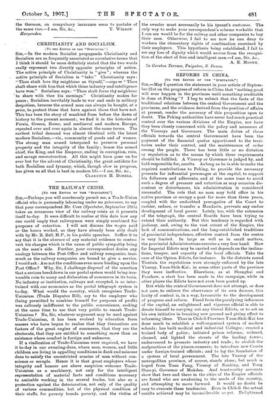THE RAILWAY CRISIS.
LTO THE EDITOR OF TUB "SPECTATOR."]
SIR,—Perhaps you will courteously permit me, a Trade-Union official who is personally labouring under no grievance, to say that your correspondent Mr. Cree (Spectator, September 28th) takes an erroneous view of the railway crisis as it presents itself to-day. It were difficult to realise at this date how any one could imply that railwaymen were simply combined for purposes of extortion. I will not discuss the wages paid or the hours worked, as they have already been ably dealt with by Mr. R. Bell, M.P., in his public speeches. Suffice it to say that it is the absence of any material evidence to contro- vert his charges which is the cause of public sympathy being on the men's side. Further, your correspondent denies any analogy between the Post Office and railway companies, inas- much as the railway companies are bound to give a service. I would ask : Are not the conditions even more binding upon the Post Office ? Why, Sir, I challenge disproof of the assertion that a serious breakdown in our postal system would bring irre- vocable ruin to many and dislocation of commerce in its train. No industry or institution, railways not excepted, is so inter- twined with our economics as the postal telegraph system is to-day. What would the country, which recognises Trade- Unionism (Trade Disputes Bill), say to the employer who (being permitted to combine himself for purposes of profit) was callously indifferent to the public convenience, seeking at the same time to use that very public to smash Trade- Unionism ? No, Sir, whatever argument may be used against Trade-Unionism, it has been evolved by education from masses who have begun to realise that they themselves are factors of the great engine of commerce, that they are the electorate, that they are entitled to something more than an existence where comfort is foreign and unknown.
If a vindication of Trade-Unionism were required, we have it to-day in our sweating-dens, where men, women, and little children are living in appalling conditions in dank and noisome dens to satisfy the unrestricted avarice of men without con- science or scruple. Hence it is that great employers whose integrity and honour are above suspicion welcome Trade- Unionism as a machinery, not only for the intelligent representation of material facts and conditions necessary to amicable working in the several trades, but also as a protection against the deterioration, not only of the quality of various commodities, but of the physical condition of their staffs, for poverty breeds poverty, and the victim of
the sweater must necessarily be his tyrant's customer. The only way to make your correspondent's scheme workable that
I can see would be for the railway and other companies to buy their men. Otherwise, I fail to see bow he can deny to workers the elementary rights of combination exercised by their employers. This hypothesis being established, I fail to see any loss of dignity which would accrue from the recogni- tion of the elect of free and intelligent men.—I am, Sir, &c., A. E. MooRE.
7a Gerston Terrace, Paignton, S. Devon.






























































 Previous page
Previous page